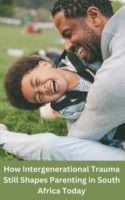Growing up, I thought my grandparents were my parents, but later on, I found out that my mom, who I thought was my sister, was my mom. She was away in Cape Town, working and sending money home to help raise me. While I understand now that it was necessary, it strained our relationship. I didn’t spend much of my childhood with her, so she feels like an outsider in my life. Instead, my grandmother was my comfort and the person I got closest to.
Parenting in South Africa is heavily influenced by the legacy of apartheid, which has caused intergenerational trauma. This refers to the transmission of traumatic experiences and their psychological effects across generations. The history of apartheid and its legacy of racial segregation, violence, and oppression have led to widespread trauma and its intergenerational transmission in South Africa.
Many South African parents have experienced trauma, such as violence, poverty, and discrimination, making it challenging to provide safe and nurturing environments for their children. According to Duke University Office for Institutional Equity research, intergenerational trauma can lead to patterns of behaviour and parenting styles that perpetuate trauma across generations. For example, parents who experienced trauma may have difficulty regulating their emotions and may be more likely to engage in harsh or inconsistent parenting practices.
My experience of being raised by my grandparents was a “norm” that never should have been. However, since it was what my mom knew as a norm, she saw it as the right thing to do. This parenting pattern has perpetuated the trauma of being unable to create and engage in conversations with your parents.
The legacy of Apartheid has had a profound impact on my family. The trauma my grandparents experienced, being separated and oppressed, and my grandfather having to work in another province to provide for the family he sees once a year, has been transmitted to me through parenting patterns. In addition to the legacy of apartheid, South Africa continues to experience ongoing violence and trauma in the post-apartheid era. High levels of crime, political unrest, and social inequality continue to impact the country and contribute to intergenerational trauma.
I live in one of the biggest townships in South Africa, a high crime rate area, and I’m expecting a baby boy. I’m acutely aware of intergenerational trauma’s impact on families, but I’m determined to break the cycle. By acknowledging the legacy wounds that have been passed down through my family, I can work towards healing and creating a better life for my child. It won’t be easy, but I’m ready for the challenge.
How has intergenerational trauma impacted your life and your relationships with your family members?



